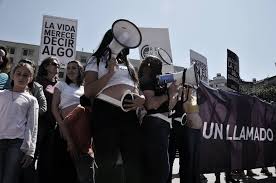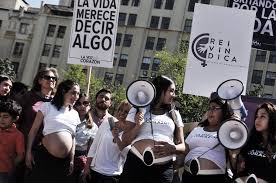Will their heartbeats stop the violence?

On October 2nd, the International Day of Non-Violence, a Chilean feminist movement led one of the simplest, but most heart-breaking, pro-life protests. For the first time, the voices of the protest were those of prospective abortion victims.
Coordinated by the national NGO Reivindica, an organization that aims to empower “different” voices of women (meaning, the voices not considered by mainstream pro-abortion feminists), pregnant Chilean women gathered in Plaza de la Constitución, then marched to the government buildings. But this time, the women did not speak. They carried loudhailers, which broadcasted the sounds of their unborn children’s heartbeats.
As one participant reported, “Abortion activists lost all their words. They watched in silence: the voice of those hearts was an unanswerable question.” Indeed, this will probably be the reaction of all who watch this video, and listen to those little hearts.

As it states in its press release, Reivindica Feminist Movement holds that women today are mainly marginalized for their maternity. Women are not really free to be mothers. If they choose to be, they are left out of the debate.
Reivindica brings together women from diverse backgrounds. They are often single mothers who lack economic resources and family to support them. Still, these women do not ask for “safe” abortions. As they showed last week – and as their babies’ voices confirmed – they want to defend their own lives as well as those of their children.
These women have been largely ignored in the most recent Chilean Senate’s hearings on the new abortion bill, which is about to be approved. They do not attract the attention of the media either.
This anonymity, the disappearance of mothers’ and motherhood’s rights, is present around the world. A quick skim through the UN resolutions addressing the issue of women’s rights in the next General Assembly will reveal how rarely the word “mother” appears. And this, sadly, is not news either.
Rosario Vidal, president of Reivindica, found that the International Day of Non-Violence was the perfect opportunity for women to affirm how “abortion not only is an act of aggression against a human being during gestation, but furthermore originates in contexts that are also violent for women. As such, abortion cannot be catalogued as a basic freedom.”
“We cannot consider the idea of naturalizing abortion as ‘progress,’” she continued. “Women are moved by love, because we love a child – and not just a thing – from the womb, and we love women who have gone through pregnancies in highly adverse situations.”
As the old saying goes, “Out of sight, out of mind.” La Voz del Corazon, ‘the voice of the heart,’ is a project that aims to go beyond the invisibility of the child. With those simple megaphones, unborn babies do not only speak to our consciences, but also to our ears.
In the last few years, several US states’ legislatures have tried to pass “fetal heartbeat bills”, which prohibit abortion once the heartbeat of the unborn can be detected.
Breaking news: a team funded by British Heart Foundation, just found that the first heartbeat happens as early as 16 days after conception.

View online at: https://c-fam.org/turtle_bay/will-heartbeats-stop-violence/
© 2025 C-Fam (Center for Family & Human Rights).
Permission granted for unlimited use. Credit required.
www.c-fam.org

